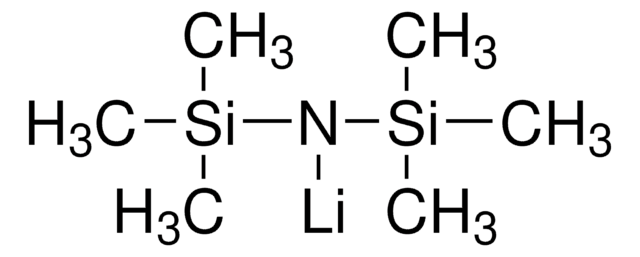401757
Tetrahydrofuran
≥99.9%, anhydrous, inhibitor-free
Synonym(s):
THF, Butylene oxide, Oxolane, Tetramethylene oxide
About This Item
143 mmHg ( 20 °C)
Recommended Products
Product Name
Tetrahydrofuran, anhydrous, ≥99.9%, inhibitor-free
grade
anhydrous
Quality Level
vapor density
2.5 (vs air)
vapor pressure
114 mmHg ( 15 °C)
143 mmHg ( 20 °C)
Assay
≥99.9%
form
liquid
autoignition temp.
610 °F
expl. lim.
1.8-11.8 %
impurities
≤20 ppm peroxide (as H2O2)
<0.002% water
<0.005% water (100 mL pkg)
evapn. residue
<0.0005%
refractive index
n20/D 1.407 (lit.)
pH
~7
bp
65-67 °C (lit.)
mp
−108 °C (lit.)
solubility
H2O: soluble
density
0.889 g/mL at 25 °C (lit.)
SMILES string
C1CCOC1
InChI
1S/C4H8O/c1-2-4-5-3-1/h1-4H2
InChI key
WYURNTSHIVDZCO-UHFFFAOYSA-N
Looking for similar products? Visit Product Comparison Guide
General description
Application
It may be used in the following processes:
- Formation of butyrolactone (BTL) by green oxidation method.
- Aqueous THF solution to modify the polystyrene surface by swelling process.
- As a solvent for lignin depolymerization to isolate phenolic monomer.
Packaging
Other Notes
Read more about THF alternatives:
2-Methyltetrahydroun (2-MeTHF): A biomass-Derived solvent with Broad Applications in Organic Chemistry
The toxicological assessment of cyclopentyl methyl ether (CPME) as a green solvent"
Legal Information
Signal Word
Danger
Hazard Statements
Precautionary Statements
Hazard Classifications
Acute Tox. 4 Oral - Carc. 2 - Eye Irrit. 2 - Flam. Liq. 2 - STOT SE 3
Target Organs
Central nervous system, Respiratory system
Supplementary Hazards
Storage Class Code
3 - Flammable liquids
WGK
WGK 1
Flash Point(F)
-6.2 °F - closed cup
Flash Point(C)
-21.2 °C - closed cup
Personal Protective Equipment
Choose from one of the most recent versions:
Already Own This Product?
Find documentation for the products that you have recently purchased in the Document Library.
Customers Also Viewed
Articles
Tandem hydroboration Suzuki Coupling both intermolecular and intramolecular gave diverse alkyl substituted products dppf
Substances are said to be miscible in one another if they dissolve to form a uniform solution. Bookmark or download our miscibility table for common lab solvents.
Our team of scientists has experience in all areas of research including Life Science, Material Science, Chemical Synthesis, Chromatography, Analytical and many others.
Contact Technical Service









